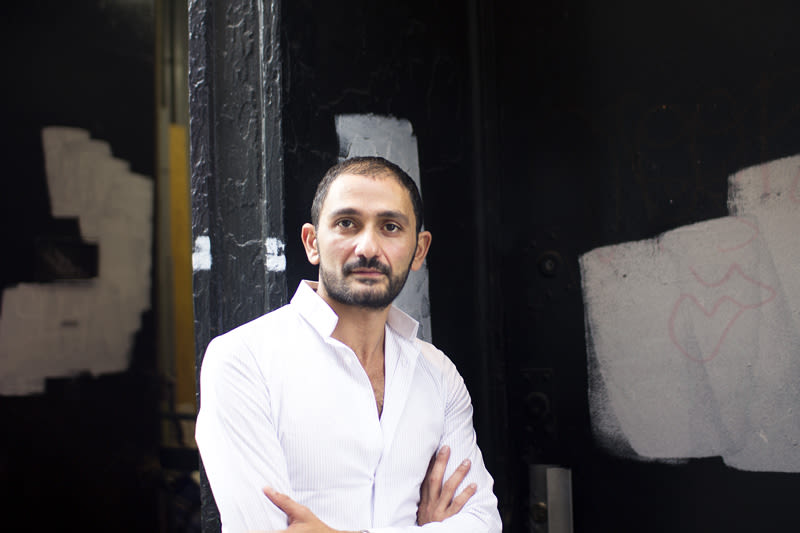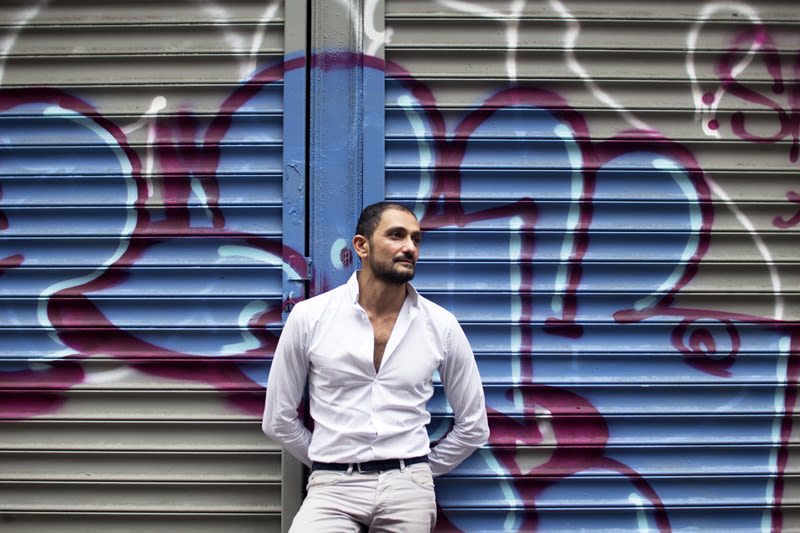Francis Kurkdjian has created over 40 fragrances for major fashion houses (among them Iris Nobile for Acqua di Parma, Cologne Blanche and Eau Noire for Dior, Armani’s Armani Mania, and, perhaps most notably, Le Mâle for Jean Paul Gaultier when he was 25 years old). He's also [collaborated with artist Sophie Calle](http://www.franciskurkdjian.com/francis-kurkdjian 18_collaborations-artistiques_l-odeur-de-l-argent_55.html) (he created the “scent of money,” namely that of a dollar bill that has been thumbed, pocketed, and passed hand to hand, for one of her exhibitions); he's helmed fragrance-focused installations at Versailles and the Fondation Cartier; and received both the highly regarded Prix François Coty for lifetime achievement (2001) and the Chevalier des Arts et des Lettres from the French government (2008). He started his own ITG-beloved line, Maison Francis Kurkdjian, in 2009, and when we spoke to him late this fall, he was frankly a little sick and tired of people trashing the synthetic ingredients sometimes employed in the creation of perfumes.
“Imagine constructing a building only with stones and natural products, so, without steel and without glass,” he explained over coffee in SoHo, half-way through an international tour to promote his Maison, which boasts a range of seven fragrances plus laundry detergent, children’s bubbles, incense papers, scent-infused leather bracelets, home sprays and a bespoke perfume service. “A modern city without steel and glass would just be huts,” he said, pausing to grab a fork and knife in each fist, holding them perpendicular to the table. “Synthetic notes,” he continued, gesturing with the cutlery, “are the backbone of the structure, the longer-lasting notes, or the steal beams in the building you’re making. If you use only natural products, in two hours they will die on your skin and you will have no aura, no power,” He thumped the ends of the silverware against the table for emphasis. “The chemical acts as a foundation, but also the backbone, and the muscle. You should use the natural notes to wrap around it, making the end result look and smell completely natural, even though it’s not.” He returned the knife and fork to the neighboring table and continued. “It’s like music: the piano has eighty-five white and black keys. Think about Bach, Mozart…the notes and those keys, the ingredients you are given are nothing—what matters is your inspiration and the composer, what you do with what you’re given.”
When Kurkdjian launched his own brand three years ago, he sought to avoid including written descriptions of the perfume ingredients (he considered such blurbs intentionally misleading and “clichéd”). After six months, his business partner told him the salespeople were having trouble at counters when customers pressed them for details about the formulations. “Sure, there is a sense of richness, a sense of knowledge, like at an art exhibition, when there is a label that tells you, ‘Pencil on wood by blah blah blah,'” he conceded. “But in perfume, this is not what you go for first. First is the smell, the way it makes you feel. The problem is that the industry and the marketing and the retailers, they go back to what’s inside right away, and then you forget what it smells like. Perfume is not just the sum total of the ingredients—there’s an artistic value.” Synthetic notes are neither a good or bad, he explained, they are just necessary. “It’s like words when you write—you need all the words to make your points, not just the ones you like to use. We need [synthetic ingredients] to express ourselves, like music. If you have electronic instruments, you can still play the same sheet music that you would have had a hundred years ago. It is just a little more modern.” His perfumes now come with (notably poetic) concise olfactory descriptions.
A fragrance from Maison Francis Kurkdjian has an 18-month gestation period—and always begins with the name. “The name is the final turn of the key, the last gate before the creation,” he said. “When I know what I want to do, I just know. I know that I can rely on my technique.” He proffered a small vial of an as-yet-unreleased formula for 2013. “I can't tell you the name,” he said, “but you can try it,” He spritzed and this reporter almost rubbed her wrists together, in a move familiar to anyone who's ever cruised the fragrance counter at a department store, before he intervened—'Don't rub,” he warned. “Rubbing hits the skin and accelerates the evaporation, the course of the perfume. It's like hitting fast-forward on a cassette tape,”
As for his particular technique and aesthetic, “Everybody has their own language,” he explained. “Each perfumer is different. The smell of jasmine, for example, is flowery but it’s also dirty. To me, it smells like New York, like Central Park.” There's jasmine in Central Park? Kurkdjian laughed. “The first time I came to New York, I was walking to the park and five blocks before, I started to smell jasmine, and I was amazed, picturing these fields of it in Central Park. I was so excited, and then right around 59th street, I started to see horses and carriages. Jasmine flowers, even on the plant, have some of the same chemical compounds that you find in horse shit. It was May, when the air is kind of lukewarm and a little bit wet, and if you smell Central Park, it smells like the dirty and animalistic notes in jasmine, and it’s the same thing in the horse shit.” Kurkdjian grinned and, sensing his audience was unconvinced, or at least unwilling to correlate a much-loved scent with manure, continued: “It's not a bad thing, and it's not that bizarre. There are shared elements there,”
In the years he's been making people smell better, Kurkdjian has made a few observations. Like, the tendency of women to change perfumes when they're experiencing a dramatic life shift (pregnancy, a divorce, a marriage). Sound familiar? As for the difference between American fragrance shoppers and their European counterparts, “You can’t generalize about what ‘American women like’ in a scent,” he said. “You can’t just talk about American women. You have the East coast, West coast, Middle America, North, and South—that’s where you see the differences. But I would say that New York is boring for fragrance. It's too clean and washed out. In the U.S., sexiness is translated to cleanliness. But if you go in the Middle East or Europe, sexy is not ‘clean.’” When this reporter noted that even excluding the aforementioned horse manure, New York isn’t exactly known for it’s clean living, Kurkdjian laughed. “I see the coastal United States as very anti-perfume. It’s very funny,” he said. “New York is very clean. If you go into New Jersey, if you go outside of New York, it’s a different story. People like a stronger scent. What is funny is you would think that if you lived somewhere hot, you would want a 'fresher' scent, but in the Middle East, they don’t—they want something stronger,”
Strong, soft, bold, classic—whatever you choose—at the end of the day, the master perfumer just hopes women will keep their options open. “I think having just one perfume is nonsense. It’s denying the modernity of woman. You can’t always wear the same suit or the same evening dress. To me, it’s like a wardrobe: you should have everything from lingerie to a tuxedo, but always feel whatever option you choose... It’s not about smelling the same—it’s about feeling the same; you feel good. Even though the perfume can be a statement and strong, you need to have space between the skin and your mind so your perfume becomes you and you don’t become the perfume. Still, the perfume has its own signature. It's like someone being able to tell wh0 designed your dress; it's not a bad thing,”
—Alessandra Codinha
Francis Kurkdjian photographed in New York by Elizabeth Brockway on November 10th, 2012.




